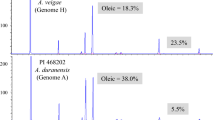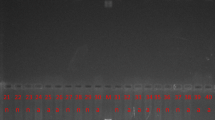Abstract
Key message
Contamination at the FAD2B locus due to inadequate screening protocols is the primary cause of sporadic, insufficient oleic acid content in Virginia-type peanut.
Abstract
The high oleic trait in peanut is conditioned by loss-of-function mutations in a pair of homeologous enzymes and is well known to improve the shelf life of peanut products. As such, the trait is given high priority in current and future cultivars by the North Carolina State University peanut breeding program. For unknown reasons, high oleic cultivars and breeding lines intermittently failed to meet self-imposed thresholds for oleic acid content in internal testing. To determine why, a manual seed chipper, crude DNA isolation protocol, genotyping assays for both mutations, and a web-based SNP calling application were developed. The primary cause was determined to be contamination with normal oleic seeds resulting from inadequate screening protocols. In order to correct the problem, a faster screening method was acquired to accommodate a higher oleic acid threshold. Additionally, results showed the mutation in one homeolog is fixed in the program, dig date had no significant effect on oleic acid content, and minor modifiers segregating within the program explained 6% of the variation in oleic acid content.


Similar content being viewed by others
Data availability
The linked phenotype and genotype datasets generated and analyzed during the current study are available from the corresponding author on reasonable request.
References
Andersen PC, Gorbet DW (2002) Influence of year and planting date on fatty acid chemistry of high oleic acid and normal peanut genotypes. J Agric Food Chem 50:1298–1305. https://doi.org/10.1021/jf0113171
Balota M, Dunne J, Cazenave AB, Anco D (2020) 2019 peanut variety and quality evaluation results - quality data. https://www.sites.ext.vt.edu/newsletter-archive/peanut variety and quality evaluation/2019-quality-data.pdf
Balota M, Dunne J, Cazenave AB, et al (2021) 2020 Peanut variety and quality evaluation results - quality data. https://www.sites.ext.vt.edu/newsletter-archive/peanut variety and quality evaluation/2020_peanut_variety_qd.pdf
Barkley NA, Chamberlin KDC, Wang ML, Pittman RN (2010) Development of a real-time PCR genotyping assay to identify high oleic acid peanuts (Arachis hypogaea L.). Mol Breed 25:541–548. https://doi.org/10.1007/s11032-009-9338-z
Barkley NA, Chenault Chamberlin KD, Wang ML, Pittman RN (2011) Genotyping and fatty acid composition analysis in segregating peanut (Arachis hypogaea L.) populations. Peanut Sci 38:11–19. https://doi.org/10.3146/ps10-17.1
Barkley NA, Isleib TG, Wang ML, Pittman RN (2013) Genotypic effect of ahFAD2 on fatty acid profiles in six segregating peanut (Arachis hypogaea L) populations. BMC Genet 14:1–13. https://doi.org/10.1186/1471-2156-14-62
Braddock JC, Sims CA, O’Keefe SF (1995) Flavor and oxidative stability of roasted high oleic acid peanuts. J Food Sci 60:489–493. https://doi.org/10.1111/j.1365-2621.1995.tb09809.x
Bruner AC, Jung S, Abbott AG, Powell GL (2001) The naturally occurring high oleate oil character in some peanut varieties results from reduced oleoyl-PC desaturase activity from mutation of aspartate 150 to asparagine. Crop Sci 41:522–526. https://doi.org/10.2135/cropsci2001.412522x
Chen Z, Wang ML, Barkley NA, Pittman RN (2010) A simple allele-specific PCR assay for detecting FAD2 alleles in both a and b genomes of the cultivated peanut for high-oleate trait selection. Plant Mol Biol Report 28:542–548. https://doi.org/10.1007/s11105-010-0181-5
Chu Y, Ramos L, Holbrook CC, Ozias-Akins P (2007) Frequency of a loss-of-function mutation in oleoyl-PC desaturase (ahFAD2A) in the mini-core of the U.S. peanut germplasm collection. Crop Sci 47:2372–2378. https://doi.org/10.2135/cropsci2007.02.0117
Chu Y, Holbrook CC, Ozias-Akins P (2009) Two alleles of ahFAD2B control the high oleic acid trait in cultivated peanut. Crop Sci 49:2029–2036. https://doi.org/10.2135/cropsci2009.01.0021
Clevenger JP, Korani W, Ozias-akins P, Jackson S (2018) Haplotype-based genotyping in polyploids. Front Plant Sci 9:1–6. https://doi.org/10.3389/fpls.2018.00564
Davis BI, Agraz CB, Kline M et al (2021) Measurements of high oleic purity in peanut lots using rapid, single kernel near-infrared reflectance spectroscopy JAOCS. J Am Oil Chem Soc 98:621–632. https://doi.org/10.1002/aocs.12487
Hancock W (2018) Improving resistance to multiple diseases in peanut using traditional and molecular breeding methods, North Carolina State University
Isleib TG, Young CT, Knauft DA (1996) Fatty acid genotypes of five virginia-type peanut cultivars. Crop Sci 36:556–558. https://doi.org/10.2135/cropsci1996.0011183X003600030003x
Isleib TG, Pattee HE, Sanders TH et al (2006a) Compositional and sensory comparisons between normal- and high-oleic peanuts. J Agric Food Chem 54:1759–1763. https://doi.org/10.1021/jf052353t
Isleib TG, Wilson RF, Novitzky WP (2006b) Partial dominance, pleiotropism, and epistasis in the inheritance of the high-oleate trait in peanut. Crop Sci 46:1331–1335. https://doi.org/10.2135/cropsci2005.09-0313
Isleib TG, Pattee HE, Tubbs RS et al (2015) Intensities of sensory attributes in high- and normal-oleic cultivars in the uniform peanut performance test. Peanut Sci. https://doi.org/10.3146/ps15-10.1
Jung S, Powell G, Moore K, Abbott A (2000a) The high oleate trait in the cultivated peanut [Arachis hypogae L.]. II. Molecular basis and genetics of the trait. Mol Gen Genet 263:806–811. https://doi.org/10.1007/s004380000243
Jung S, Swift D, Sengoku E et al (2000b) The high oleate trait in the cultivated peanut [Arachis hypogaea L.]. I. Isolation and characterization of two genes encoding microsomal oleol-PC desaturases. Mol Gen Genet 263:796–805. https://doi.org/10.1007/s004380000244
Knauft DA, Moore KM, Gorbet DW (1993) Further studies on the inheritance of fatty acid composition in peanut1. Peanut Sci 20:74–76. https://doi.org/10.3146/i0095-3679-20-2-2
López Y, Nadaf HL, Smith OD et al (2000) Isolation and characterization of the Δ12-fatty acid desaturase in peanut (Arachis hypogaea L.) and search for polymorphisms for the high oleate trait in Spanish market-type lines. Theor Appl Genet 101:1131–1138. https://doi.org/10.1007/s001220051589
Lopez Y, Smith OD, Senseman SA, Rooney WL (2001) Genetic factors influencing high oleic acid conten in spanish market-type peanut cultivars. Crop Sci 41:51–56
Moore KM, Knauft DA (1989) The inheritance of high oleic acid in peanut. J Hered 80:252–253. https://doi.org/10.1093/oxfordjournals.jhered.a110845
Mozingo RW, O’Keefe SF, Sanders TH, Hendrix KW (2004) Improving shelf life of roasted and salted inshell peanuts using high oleic fatty acid chemistry. Peanut Sci 31:40–45. https://doi.org/10.3146/pnut.31.1.0009
Norden AJ, Gorbet DW, Knauft DA, Young CT (1987) Variability in oil quality among peanut genotypes in the florida breeding program. Peanut Sci 14:7–11. https://doi.org/10.3146/i0095-3679-14-1-3
O’Keefe SF, Wiley VA, Knauft DA (1993) Comparison of oxidative stability of high- and normal-oleic peanut oils. J Am Oil Chem Soc 70:489–492. https://doi.org/10.1007/BF02542581
Otyama PI, Chamberlin K, Ozias-Akins P, Graham MA, Cannon EKS, Cannon SB, MacDonald GE, Anglin NL (2022) Genome-wide approaches delineate the additive, epistatic, and pleiotropic nature of variants controlling fatty acid composition in peanut (Arachis hypogaea L.). G3 Genes Genomes Genet. https://doi.org/10.1093/g3journal/jkab382
Pandey MK, Wang ML, Qiao L et al (2014) Identification of QTLs associated with oil content and mapping FAD2 genes and their relative contribution to oil quality in peanut (Arachis hypogaea L.). BMC Genet 15:1–14. https://doi.org/10.1186/s12863-014-0133-4
Patel M, Jung S, Moore K et al (2004) High-oleate peanut mutants result from a MITE insertion into the FAD2 gene. Theor Appl Genet 108:1492–1502. https://doi.org/10.1007/s00122-004-1590-3
Pattee HE, Isleib TG, Gorbet DW et al (2002a) Effect of the high-oleic trait on roasted peanut flavor in backcross-derived breeding lines. J Agric Food Chem 50:7362–7365. https://doi.org/10.1021/jf025854c
Pattee HE, Isleib TG, Moore KM et al (2002b) Effect of high-oleic trait and paste storage variables on, sensory attribute stability of roasted peanuts. J Agric Food Chem 50:7366–7370. https://doi.org/10.1021/jf025853k
Ray TK, Holly SP, Knauft DA et al (1993) The primary defect in developing seed from the high oleate variety of peanut (Arachis hypogaea L.) is the absence of Δ12-desaturase activity. Plant Sci 91:15–21. https://doi.org/10.1016/0168-9452(93)90184-2
Talcott ST, Passeretti S, Duncan CE, Gorbet DW (2005) Polyphenolic content and sensory properties of normal and high oleic acid peanuts. Food Chem 90:379–388. https://doi.org/10.1016/j.foodchem.2004.04.011
Tonnis B, Wang ML, Li X et al (2020) Peanut FAD2 genotype and growing location interactions significantly affect the level of oleic acid in seeds. JAOCS, J Am Oil Chem Soc 97:1001–1010. https://doi.org/10.1002/aocs.12401
USDA NASS (2021) State agricultural overview. https://www.nass.usda.gov/Statistics_by_State/Ag_Overview/
Zheng X, Hoegenauer KA, Maeda ABV et al (2015) Non-destructive high-throughput dna extraction and genotyping methods for cotton seeds and seedlings. Biotechniques 58:234–243. https://doi.org/10.2144/000114286
Acknowledgements
The authors would like to acknowledge Neil Bain and Robbie Hickman of the Biological and Agricultural Engineering Research Shop for assistance in the design and construction of the seed chipper as well as the North Carolina Peanut Growers Association and the North Carolina Foundation Seed Producers for financial support of this project.
Funding
This work was supported by grant number 2021–0559 from the North Carolina Peanut Growers Association.
Author information
Authors and Affiliations
Contributions
RJA designed the seed chipper, performed the genotyping, and wrote the manuscript. JCD determined the field design, developed the SNP caller, performed the data analysis, and edited the manuscript. Both RJA and JCD planned the experiment and conducted the phenotyping.
Corresponding author
Ethics declarations
Conflict of interests
The authors have no relevant financial or non-financial interests to disclose.
Additional information
Communicated by Volker Hahn.
Publisher's Note
Springer Nature remains neutral with regard to jurisdictional claims in published maps and institutional affiliations.
Supplementary Information
Below is the link to the electronic supplementary material.
Rights and permissions
Springer Nature or its licensor holds exclusive rights to this article under a publishing agreement with the author(s) or other rightsholder(s); author self-archiving of the accepted manuscript version of this article is solely governed by the terms of such publishing agreement and applicable law.
About this article
Cite this article
Andres, R.J., Dunne, J.C. Understanding variation in oleic acid content of high-oleic virginia-type peanut. Theor Appl Genet 135, 3433–3442 (2022). https://doi.org/10.1007/s00122-022-04190-0
Received:
Accepted:
Published:
Issue Date:
DOI: https://doi.org/10.1007/s00122-022-04190-0




